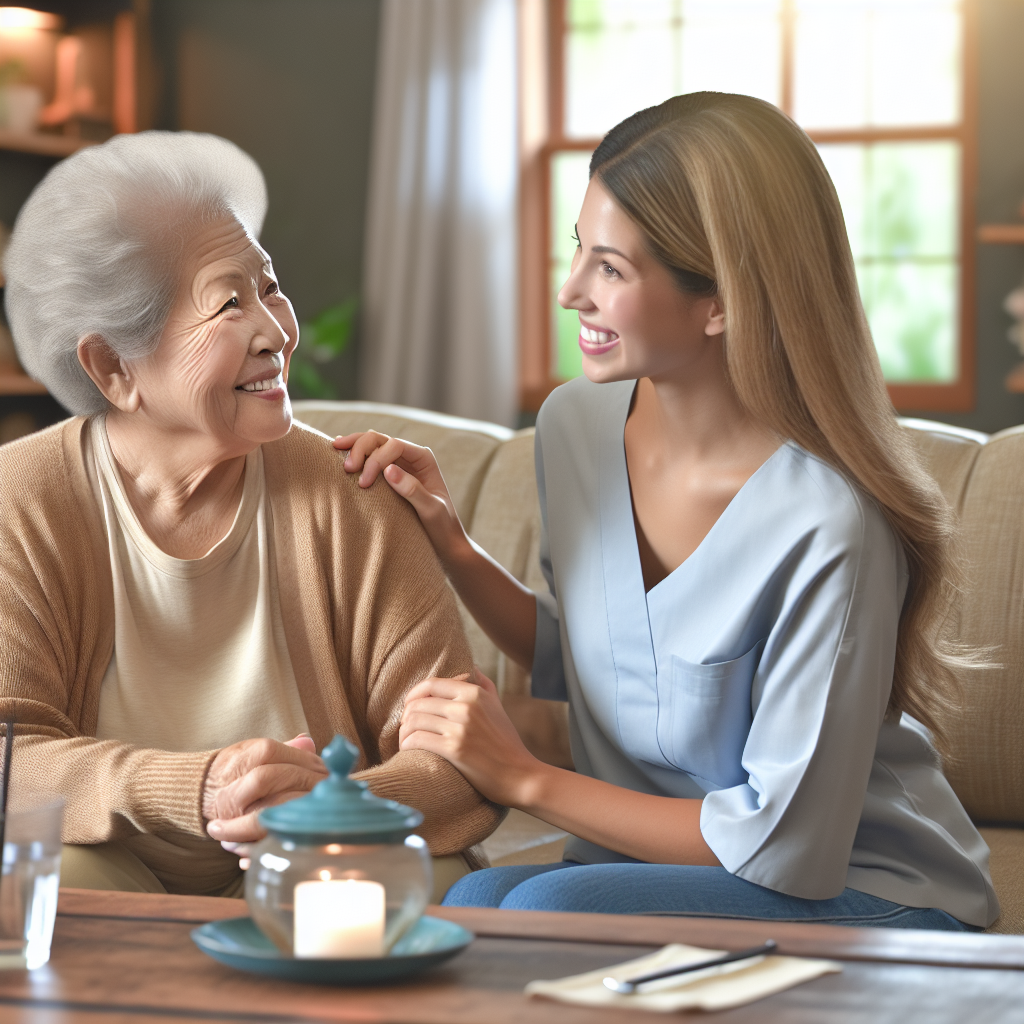Non-Medical Home Health Care: Your Complete Resource Guide
Introduction
Welcome to the ultimate resource guide on home health care non medical! If you’re here, chances are you’re juggling the delicate balance of caring for a loved one while trying to maintain your sanity and maybe even your social life. We get it; it’s like trying to fold a fitted sheet while riding a roller coaster. But fear not! This guide is designed to help you navigate the often-choppy waters of non-medical home care.
Non-medical home care is not just about having someone around to make sure Grandma doesn’t burn down the kitchen. It’s about offering comprehensive support that enhances her quality of life while allowing her to age gracefully in place. From personal care services to elderly companion care, we’ll explore how these services can transform daily living into something enjoyable and manageable.
According to recent projections, the demand for home healthcare is expected to soar by a whopping 33% from 2020 to 2030, significantly outpacing growth in other sectors. This trend highlights an increasing recognition of the importance of non-medical support for seniors. So whether you’re looking for in-home caregiver services, or just trying to figure out how to keep your aging parent engaged and happy, you’re in the right spot!
This guide will unpack everything you need to know about non-medical home health care, including types of services available, tips for selecting the right provider, and how family dynamics play into these crucial decisions. So grab a cup of coffee (or tea if that’s your jam), sit back, and let’s dive into this enlightening journey together!
Understanding Non-Medical Home Health Care
So, what exactly is home health care non medical? Think of it as the friendly neighbor who checks in on you with a warm pie, but instead of pie, they bring assistance and companionship. Non-medical home health care focuses on providing support for daily living activities without involving medical treatments or procedures.
Non-medical home care includes a variety of services aimed at helping seniors maintain their independence and quality of life while aging in place. This can range from personal care services to companion care, all designed to make life a little easier and a lot more enjoyable.
The Importance of Non-Medical Support for Seniors
As our loved ones age, they may face challenges that require extra help around the house or companionship to combat loneliness. This is where non-medical support comes into play. It’s like having a trusty sidekick someone who not only assists with daily tasks but also provides emotional support. Whether it’s helping with household chores or simply sharing a cup of tea, these services can significantly enhance the quality of life for seniors.
Differences Between Medical and Non-Medical Care
While medical care involves healthcare professionals providing treatments and therapies, non-medical care focuses on everyday assistance. Here’s a quick breakdown:
| Aspect | Medical Care | Non-Medical Care |
|---|---|---|
| Provider | Healthcare professionals (doctors, nurses) | Caring companions (aides, caregivers) |
| Main Focus | Treating medical conditions | Supporting daily living activities |
| Examples of Services | Medication management, physical therapy | Personal aide for seniors, companionship services |
This distinction is crucial when considering options for your loved ones. If they need help with everyday tasks rather than medical interventions, then non-medical home care might be the perfect fit!
Takeaway: Understanding the differences between medical and non-medical home health care is essential in selecting the right type of support for your loved ones as they navigate their golden years.
If you’re considering options for senior personal care or just want to learn more about how these services can help your family thrive at home, keep reading!
Types of Non-Medical Home Care Services
When it comes to home health care non medical, the options are as diverse as a box of chocolates each one tailored to meet specific needs. Let’s unwrap some of the most popular types of non-medical home care services that can make life easier, safer, and more enjoyable for seniors and their families.
-
In-Home Care Services Overview
These services provide a range of support right in the comfort of home. Think of it as having a friendly superhero who swoops in to help with daily tasks, ensuring your loved ones can maintain their independence while staying safe.
-
Personal Care Services
Need help with bathing, grooming, or dressing? Personal care services are like having your very own personal aide for seniors, helping them feel fresh and fabulous every day!
-
Elderly Companion Care Options
Sometimes all we need is a good chat or someone to share a cup of tea with. Elderly companion care ensures that seniors have social interactions and companionship, reducing feelings of loneliness and isolation.
-
Home Support Services Details
This category covers everything from meal preparation to light housekeeping. Think of it as domestic help for elderly at home because who doesn’t love coming home to a tidy space and a delicious meal?
-
Respite Care for Seniors Explained
Caring for an elderly loved one can be rewarding but also exhausting. Respite care provides temporary relief for family caregivers, giving them time to recharge while ensuring their loved ones receive quality care.
-
Daily Living Assistance Features
This includes help with tasks like medication reminders, mobility assistance, and even grocery shopping. It’s all about providing the necessary support so seniors can live their best lives without feeling overwhelmed.
Takeaway: Choosing the right type of non-medical home care service is crucial for ensuring your loved ones receive the support they need while maintaining their independence. Each service plays a unique role in enhancing quality of life!
If you’re considering options for your aging parent or loved one, remember that personalized non-medical caregiving for seniors can significantly improve their day-to-day experience. Explore these services further to find the perfect fit!
The Benefits of Non-Medical Home Health Care
When it comes to home health care non medical, the benefits extend far beyond just having someone around to help with chores. It’s like having a personal cheerleader who also happens to be an expert in senior lifestyle assistance at home. Let’s dive into some of the standout perks!
- Promoting Independence and Dignity for Seniors: One of the most significant benefits is that non-medical caregiving for seniors fosters a sense of independence. With services like daily living assistance, seniors can maintain their routines and make choices about their daily lives, which is crucial for their dignity.
- Enhancing Quality of Life Through Companionship and Support: Imagine having someone not just to assist with tasks but also to share a cup of tea and chat about the latest episode of your favorite show. That’s what elderly companion care offers! It’s about more than just completing tasks; it’s about creating meaningful connections that uplift spirits.
- Coping with Emotional Challenges in Caregiving Decisions: Choosing care options can be an emotional rollercoaster. However, working with an in-home caregiver allows families to navigate these waters more smoothly. They provide not only physical support but also emotional reassurance, making it easier for families to manage the stress that often accompanies caregiving decisions.
Did You Know? According to a recent study, seniors receiving non-medical home health care report a 30% increase in overall happiness compared to those without any support. Talk about a win-win situation!
In addition, opting for non-clinical home health services means less reliance on hospital visits, which can be stressful and exhausting. Instead, families can focus on quality time together like binge-watching that new series or playing board games while knowing their loved ones are well cared for at home.
If you’re considering options for at-home personal assistance for elderly loved ones, remember that these services are customizable. Whether it’s household assistance for seniors or tailored respite care for seniors, there’s something out there designed specifically to meet your family’s unique needs.
The bottom line? Non-medical home health care isn’t just about help; it’s about enhancing life quality while providing peace of mind for both seniors and their families. So why not explore how these services can transform your loved one’s daily experience?
Selecting the Right Non-Medical Home Care Provider
Choosing a home health care non medical provider is like picking a partner for a dance it’s all about finding the right fit! You want someone who can keep up with your loved one’s rhythm while providing the right kind of support. Here are some key factors to consider:
Key Factors to Consider When Choosing a Provider
- Reputation and Reviews: Look for providers with positive testimonials and reviews. Websites like Yelp or Google can give you insight into others’ experiences.
- Services Offered: Ensure they provide the specific in-home care services your loved one needs, whether it’s daily living assistance or companion care services.
- Availability: Check if they can accommodate your schedule, especially if you need 24/7 support or just occasional visits.
- Cost and Insurance: Understand their pricing structure. Some services might be covered by insurance, so it’s worth checking!
- Compatibility: Arrange for a meet-and-greet between your loved one and the caregiver to see if they click after all, they’ll be spending quality time together!
The Role of Caregiver Qualifications and Training
The qualifications of an in-home caregiver are paramount. Look for providers who ensure their staff undergo rigorous training in areas like:
- Personal care services
- Elderly companion care
- Crisis management and first aid
- Dementia and Alzheimer’s care techniques
Did You Know? According to the National Institute on Aging, well-trained caregivers can significantly improve the quality of life for seniors by providing tailored support that meets individual needs.
The Importance of Personalized Care Plans for Seniors
No two seniors are alike, which is why customized non-medical eldercare plans at home are essential. A good provider will work with you to create a plan that addresses:
- Your loved one’s daily routines and preferences
- Specific health concerns or mobility issues
- The type of companionship they enjoy because who doesn’t love a good chat over tea?
Selecting the right non-medical home care provider is crucial in ensuring that your loved one receives not just assistance but also companionship and respect. Take your time, ask questions, and trust your instincts. After all, this choice impacts not just them but everyone involved!
Aging in Place: Support Services for Seniors at Home
Aging in place is a term that sounds like it could be the title of a cozy retirement novel, but it’s actually a vital concept for seniors who wish to live independently in their own homes. This approach lets older adults maintain their lifestyle and comfort while receiving the non-medical home care they need. So, how do we make this dream a reality? Let’s dive into some essential support services that can help!
The Concept of Aging in Place Explained
At its core, aging in place means older adults can continue living at home safely, comfortably, and independently. It’s not just about having a roof over their heads; it involves creating an environment where they can thrive without feeling like they’re living in a museum exhibit.
Home-Based Eldercare Solutions That Facilitate Aging in Place
Here are some fantastic home support services that ensure seniors can age gracefully at home:
- In-Home Care Services: These include personal care services like bathing, dressing, and grooming basically everything that keeps them looking fabulous!
- Elderly Companion Care: A friendly face to chat with can make all the difference. Companion care services provide social interaction and emotional support.
- Household Assistance for Seniors: Whether it’s meal preparation or light housekeeping, these services help keep the home running smoothly.
- Daily Living Assistance: Help with daily tasks ensures that seniors maintain their independence while receiving necessary support.
- Customized Non-Medical Eldercare Plans: Tailored plans cater to individual needs because one size does not fit all when it comes to care!
Coping Strategies for Families Supporting Aging Loved Ones at Home
Caring for an aging parent or loved one can feel like juggling flaming torches exciting but risky! Here are some strategies to keep your sanity intact while providing support:
- Create a Support Network: Don’t go it alone! Involve family members and friends to share responsibilities.
- Stay Organized: Use calendars or apps to track appointments, medications, and caregiving duties. A little organization goes a long way!
- Encourage Independence: Allow your loved ones to do as much as they can on their own. It boosts self-esteem and keeps them engaged.
- Communicate Openly: Talk about feelings and concerns openly. This helps everyone stay on the same page and reduces stress.
Aging in place isn’t just about maintaining physical health; it’s about fostering emotional well-being too. With the right resources and support systems, seniors can enjoy their golden years right at home a place where memories flourish and hearts feel full.
The Role of Family in Non-Medical Care Decisions
When it comes to home health care non medical, family plays a crucial role that often feels like the main act in a well-rehearsed play. After all, who better to understand the needs and preferences of your aging loved one than the family members who know them best? But let’s be real: navigating family dynamics during caregiving discussions can sometimes feel like trying to herd cats difficult, chaotic, and occasionally hilarious.
Navigating Family Dynamics During Caregiving Discussions
First things first: open communication is key! You might want to channel your inner diplomat when discussing non-medical home care options. Here are some tips:
- Set the Stage: Choose a comfortable environment for discussions perhaps over coffee or during a family dinner. Nobody wants to break down barriers while sitting in a sterile hospital waiting room!
- Listen Actively: Everyone has their own opinions and concerns. Make sure each family member feels heard. Sometimes, just letting someone vent about their worries can ease tensions.
- Acknowledge Emotions: Caregiving decisions are often laden with feelings of guilt, fear, and love. Recognizing these emotions can help create a supportive atmosphere.
The Emotional Aspects of Choosing Care Options Together
The decision-making process regarding non-medical home care isn’t just about logistics it’s about heartstrings too! Involving family can bring both comfort and complexity:
- Shared Responsibility: When everyone pitches in, it lightens the load on individual family members. Plus, it helps ensure that everyone is on board with the chosen care plan.
- Diverse Perspectives: Different family members may have unique insights into what kind of support your loved one needs be it personal care services or companionship through senior companionship services.
- Avoiding Common Misconceptions: Some families may mistakenly believe that hiring an in-home caregiver means they’re abandoning their loved one. Remind them that this is about enhancing quality of life through professional support!
Takeaway: The involvement of family in non-medical caregiving decisions not only fosters collaboration but also ensures that your loved one receives personalized support tailored to their needs. This can make all the difference between feeling isolated at home and thriving with daily living assistance.
Conclusion
As we wrap up our journey through the world of home health care non medical, it’s clear that this type of support is not just a luxury it’s a lifeline for many seniors and their families. With the right in-home care services, elderly individuals can maintain their independence while receiving the necessary assistance to thrive.
Choosing non-medical home care means opting for a tailored approach, where services like senior personal care, companionship services, and daily living assistance can be customized to fit individual needs. This personalized touch not only enhances the quality of life but also fosters emotional well-being, proving that sometimes, the best medicine is a caring companion.
Remember, when selecting a provider, consider factors such as qualifications, experience, and whether they offer personalized care plans. A good match can make all the difference in ensuring your loved one receives the best support possible.
In an era where aging in place is becoming more common, embracing non-medical home health care options allows seniors to enjoy their golden years in familiar surroundings. From respite care for seniors to comprehensive household assistance for seniors, these services are designed to empower both seniors and their families.
If you’re considering non-medical caregiving for your loved ones or exploring options for yourself, take that first step today. Research local providers, ask questions, and remember: you are not alone on this journey. There’s a whole world of support waiting to help you navigate this important phase of life.




